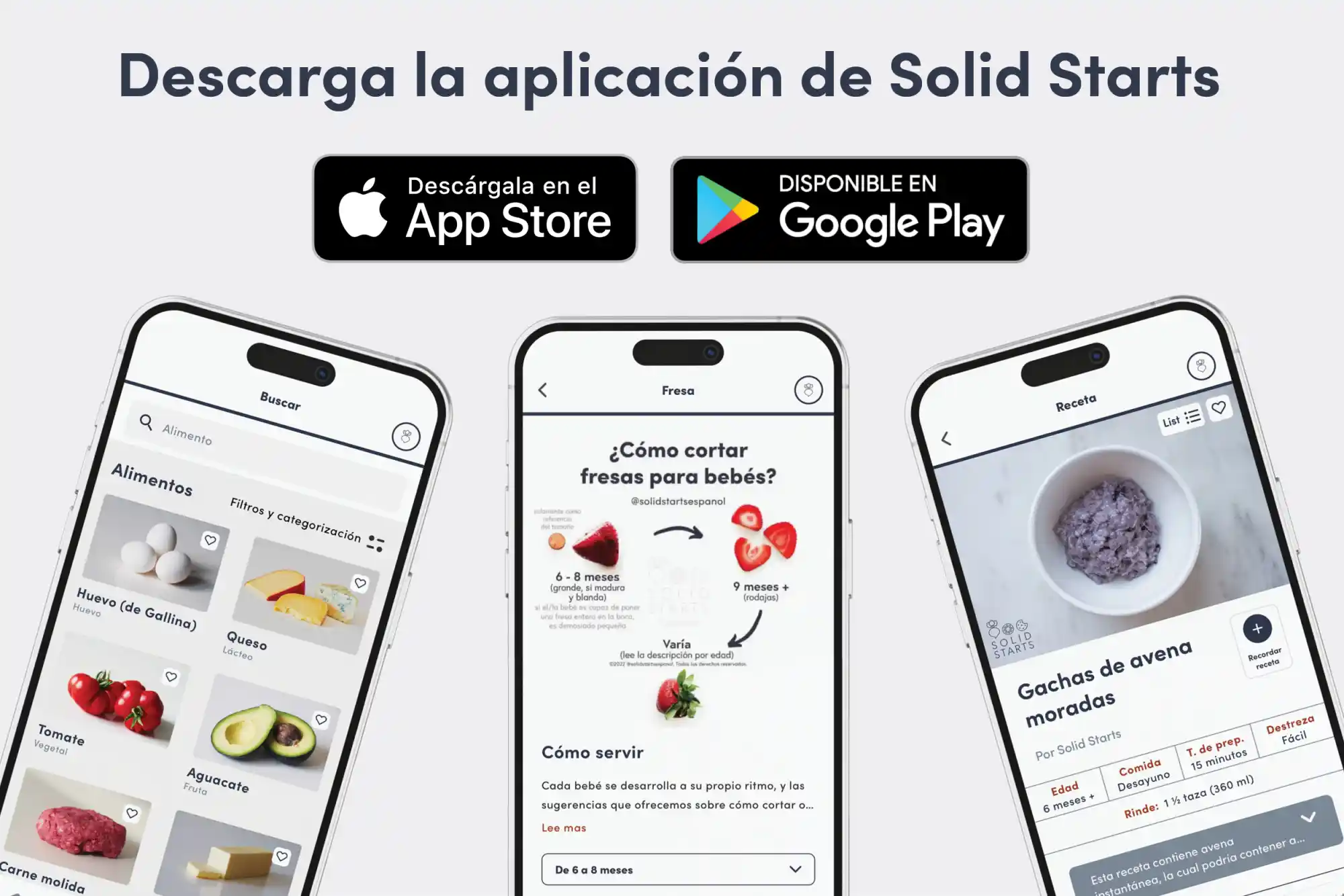Acceda a la base de datos First Foods® en Solid Starts App.
Leer másQueso parmesano
Lácteo
Sugerencia de edades
6 meses
Alto contenido de hierro
No
Alérgeno común
Sí

When can babies have parmesan cheese?
¡Lo sentimos, esta página aún no está disponible en español! Estamos trabajando tan rápido como podemos para traducir todo nuestro contenido, gracias por tu paciencia y apoyo.
Dishes that contain parmesan cheese as an ingredient may be introduced as soon as baby is ready to start solids, which is generally around 6 months of age. While parmesan cheese is high in sodium, a taste here and there as part of a varied diet is generally fine. Choose pasteurized parmesan to minimize the risk of foodborne illness.
Parmesan is part of the grana family of cheeses, which are hard, grating cheeses with origins in Italy. While parmesan is made worldwide, it is not the same as Parmigiano Reggiano, which is fiercely protected by an Italian regulation called Protected Designation of Origin. The law requires any cheese stamped with the Parmigiano Reggiano label to have been made from the milk of cows grazing in the fields of the Bologna, Mantua, Modena, or Parma regions, where the cheese is traditionally shaped into large wheels that are brined and aged. During the aging process, both parmesan and Parmigiano Reggiano develop a thick rind, which can be used to imbue stocks, soups, and stews with umami flavor.
How do you serve parmesan cheese to babies?
Cada bebé se desarrolla a su propio ritmo, y las sugerencias que ofrecemos sobre cómo cortar o preparar determinados alimentos son generalizaciones para una amplia audiencia.
6 months old +:
Feel free to share tastes of pasteurized parmesan here and there with baby as part of a varied diet. Grate the cheese and sprinkle into or on top of the dish. Just make sure that, when sharing a bite with baby, there are no large globs of melted cheese, as these can be difficult for young babies to chew and manage in the mouth. Avoid offering any kind of cheese in cubes and large chunks.
9 months old +:
Feel free to share tastes of pasteurized parmesan here and there with baby as part of a varied diet. Cut pasteurized parmesan into long, flat slices or bite-sized pieces torn from a flat slice. Alternatively, grate the cheese and serve the cheese on its own or folded into meals. Continue to avoid serving cheese in cube shapes or large melted globs, as these pose an increased choking risk.
12 months old +:
Serve pasteurized parmesan in moderation: in flat bite-sized pieces, long flat slices, or as grated or shredded cheese. Continue to mix shredded or grated parmesan into shared dishes or sprinkle on top of the child’s meals. Avoid serving parmesan in cubes or large crumbles, as these present an increased choking risk.


¡Lo sentimos, esta página aún no está disponible en español! Estamos trabajando tan rápido como podemos para traducir todo nuestro contenido, gracias por tu paciencia y apoyo.
Videos
Is parmesan a choking hazard for babies?
Yes. Cheeses like parmesan are firm and can get globby and hard to manage in the mouth, qualities that increase the risk of choking. To reduce the risk, prepare and serve parmesan in an age-appropriate way as described in the How to Serve section. As always, make sure you create a safe eating environment and stay within an arm’s reach of baby during meals.
Learn the signs of choking and gagging and more about choking first aid in our free guides, Infant Rescue and Toddler Rescue.
Is parmesan a common allergen?
Yes. Parmesan cheese is made from cow’s milk, and cow’s milk is a common food allergen in young children, accounting for about one-fifth of all childhood food allergies in the United States. Keep in mind that cheeses made from other ruminants such as sheep, goat, and buffalo may provoke similar allergic reactions to cow’s milk dairy products. That said, there’s good news: milk allergy often disappears with time. Research shows that the majority of children with cow's milk allergy will outgrow it by age 6 and many babies with milder symptoms of milk protein allergy (which can show up as painless blood in stool) are able to successfully reintroduce cow's milk as early as their first birthday, with the guidance of their doctors. Note: Aged cheeses generally contain histamines, which may cause rashes in children who are sensitive to them.
Milk is a known trigger of food protein-induced enterocolitis syndrome, also known as FPIES. FPIES is a delayed allergy to food protein which causes the sudden onset of repetitive vomiting and diarrhea to begin a few hours after ingestion. Left untreated, the reaction can result in significant dehydration. Thankfully, like other forms of milk allergy, FPIES which presents early in life is generally outgrown by the time the child has reached 3-5 years of age. While the exact rates of FPIES are unknown, it is believed to be an uncommon condition (although better recognition of the disease has led to increased reporting in recent years).
Although it is not an allergy, lactose intolerance can result in gastrointestinal symptoms, such as abdominal pain, bloating, and diarrhea, after ingestion of dairy items containing lactose. For those with older children who are lactose intolerant (keep in mind this is uncommon for infants and toddlers), some good news: compared with milk and certain other dairy products, many cheeses may be better tolerated by those with lactose intolerance, particularly aged cheeses, which have lower lactose content. Note that if your child is lactose-intolerant, it’s important to find calcium-rich foods to consume regularly to ensure a balanced diet and support bone health. Search for naturally low-lactose cheeses and dairy products labeled “lactose-free.”
If you suspect baby may be allergic to milk, consult an allergist before introducing dairy products like cheese. Based on baby’s risk factors and history, your allergist may recommend allergy testing, or may instead advise dairy introduction under medical supervision in the office. If the risk is low, you may be advised to go ahead and introduce dairy in the home setting. As with all common allergens, start by serving a small quantity on its own for the first few servings, and if there is no adverse reaction, gradually increase the quantity over future meals.
What are the benefits of sharing parmesan cheese with baby?
Parmesan cheese is rich in protein, fat, calcium, selenium, zinc, and vitamins A and B12. Together, these nutrients work together to provide the building blocks for growth, development, and brain function. They also help support bone density, taste perception, vision, energy, and immunity. Parmesan cheese is often made from unpasteurized (raw) milk, so when shopping, be sure to choose pasteurized parmesan to minimize the risk of foodborne illness.
While parmesan is high in sodium, the amount of sodium that babies eat tends to be low as they learn the skills to feed themselves, and some sodium is important for supporting baby’s electrolyte balance, hydration, and movement. While many health organizations recommend holding or reducing salt in food shared with baby, recent reviews of literature suggest that this may not be necessary. Furthermore, sharing family meals, even if they contain salt, has its benefits: baby has opportunities to explore a wider variety of food, share their family food culture, and practice eating a variety of textures.
¿Cuánta comida debo servirle al/a bebé?
Al comienzo, ofrece una pequeña cantidad y confía en que tu bebé sabe cómo mostrar interés si quiere más haciendo ruidos, gestos, o gritando o extendiendo la mano. Ten en cuenta que la mayoría de los bebés entre 6 y 9 meses de edad no consumen muchos alimentos sólidos al principio. Para los bebés de entre 10 y 12 meses de edad, enfócate en ofrecer el equivalente a una comida equilibrada para adultos, pero con porciones más pequeñas. Pon atención a las señales que te da el/la niño/a: cuando el/la bebé te muestre que desea “más”, ofrécele más comida. Cuando el/la bebé muestre señales de “ya terminé”, para de ofrecerle comida.
¿Cuántas comidas al día debe hacer un/a bebé?
Puede variar. En términos generales, la idea es traer al/a bebé a la mesa al menos una vez al día entre los 6 y 7 meses de edad, dos veces al día entre los 8 y 9 meses de edad y 3 veces al día a partir de los 10 meses de edad. Consulta nuestros ejemplos de horarios de alimentación para obtener más detalles.
Nuestro equipo
Escrito por
Consejos de expertos directo a tu bandeja de entrada
¡Suscríbete y recibe correos semanales con recetas, consejos y más!
Copyright © 2026 • Solid Starts Inc






